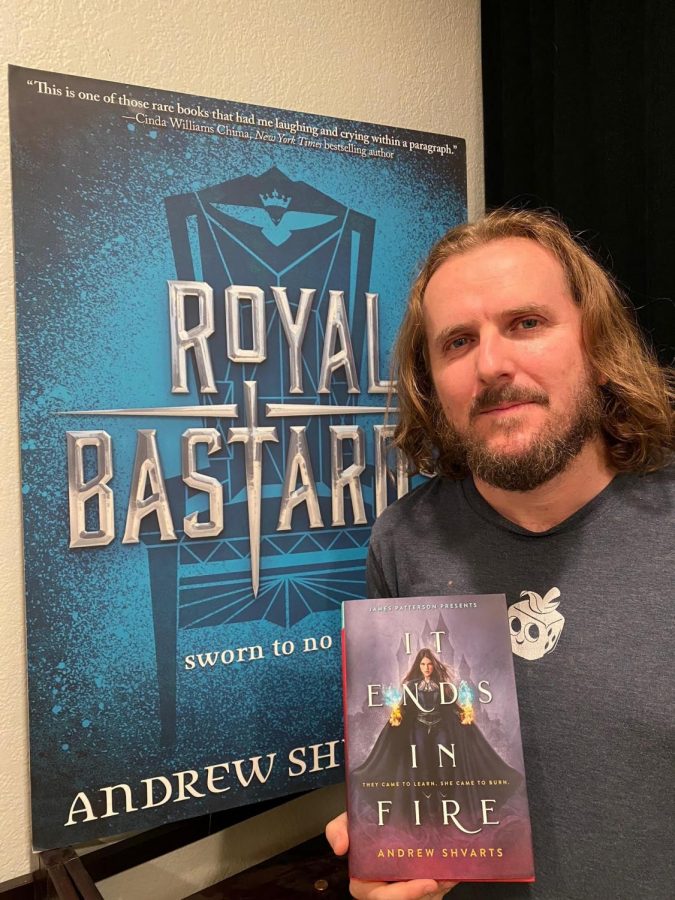So you wanna be a fantasy author?
Alum Andrew Shvarts finds compassion and bravery in magical worldbuilding
Provided by Andrew Shvarts
Harker alumnus and bestselling author Andrew Shvarts (‘03) poses with his most recent fiction publication, “It Ends in Fire,” a featured Recreate Reading book for the 2022 school year. Shvarts has had a fascination with storytelling from a young age, eventually leading to his current career as an author.
August 29, 2021
“Being a hero doesn’t mean getting rewards or praise. Being a hero means suffering so other people don’t have to. Being a hero means pain,” Andrew Shvarts (‘03) writes in the final book of his fantasy trilogy, “Royal Bastards,” which explores the escapades of a group of teenagers from royal families who bravely struggle to save their collapsing kingdom.
In his writing, Shvarts communicates succinct, gentle and down-to-earth vignettes about what it means to live and experience the world. His July-published novel, “It Ends in Fire,” which is K-12 Production Manager and Upper School Tech Theater teacher Brian Larsen’s sponsored ReCreate Reading book for the 2022 school year, follows the same pattern of intertwining themes of family and magic.
A hero by his own definition, Shvarts does not concentrate on his accomplishments, instead focusing on his deep love for writing. For Shvarts, writing is more than a career—it’s the way he lives, it’s what keeps him going and what continually inspires him. He thinks in words and phrases, snippets of stories, using writing as a vehicle to venture through life.
“I can’t not write; it’s so integral to what I do and how I think,” Shvarts said. “It’s like asking a shark to stop swimming. I can’t conceive of a world in which I’m not writing because that’s always what’s going on in my brain.”
Even from a young age, Shvarts loved the idea of entertaining people through storytelling. As he grew older, his passions blossomed into his career as an author, and he realized that he could share the stories constantly filling his mind with others.
“I’ve always wanted to be a writer for as long as I can remember,” Shvarts said. “I’ve always just loved telling stories and making things up. I’ve always lived in a fantasy world in my head, so being a writer was a natural fit.”
As he ventured further into his career as an author, Shvarts has used his work to inquire into what makes up humans, speaking to our capacities for both compassion and cruelty. He plays with contradictions and twists on tropes because they have allowed him to explore and understand the strange intricacies of human quirks.
When he writes his stories, he finds that he draws from elements of himself in the characters—the paths that the characters take become ways of reimagining the facets of his own personality and the choices that he might embrace. Shvarts has discovered that all of his books have followed a similar theme of facing both societal and personal barriers and creating a world that is new and remarkable.
“Every writer, across all their books, is always trying to answer the same question: can we be better than what came before?” Shvarts said. “It’s always about people existing within very flawed, corrupt, unjust systems [and] trying to overcome them without becoming a part of them. How do we escape our legacies and transform our world and societies, and how can we be better than the previous generations?”
Looking past the general themes of his books, readers can notice that Shvarts also follows patterns in the plots and characters of his books. Especially in the young adult (YA) genre, he is able to delve deeper and explore the nuances of teenagers combating the struggles they face in society.
“One thing that drew me to YA is how [it] is specifically [about] young people grappling with the worlds they’ve inherited and how to transcend them,” Shvarts said. “[In] the Royal Bastards trilogy and It Ends in Fire, there is always a ragtag-found family group of protagonists challenging orders and powers that seem truly insurmountable and finding ways to break them down, but also struggling with the personal costs,” Shvarts said.
Despite his passion for fantasy writing, the genre hasn’t always come easily to Shvarts. He acknowledges the obstacles he faced during his writing career but also notes the resilience and perseverance he gained from those experiences. In order to publish his books, he first needed to believe in himself and his work, continuing to write even when agents were not responsive to the pieces he was creating.
“Rejection [is] hard. I’ve failed a lot of times before I succeeded. [There were] books that didn’t get an agent, and an agent that couldn’t sell a title.” Shvarts said. “For me, I deal with rejection by [thinking] ‘Next time, it’s going to work.’”
Beyond the struggles with pitching a book, finding an agent and getting his work published, Shvarts has found it difficult to work with the business-natured publishing sphere, in which authors are often not given much control over how their books enter the public world.
“Publishing can be very emotionally frustrating in general, just the feeling of powerlessness,” Shvarts said. “You don’t get to choose your cover, you don’t get to choose your approach. There’s so much that’s out of your hands.”
Throughout the difficulties that have come with publishing, Shvarts has found support from his wife, the first person who reads Shvarts writing, and in his fellow authors who encouraged and reminded him that books are filled with more than just revenue—they are filled with love and humanity.
“I have lots of friends in the writing community who are great sources of inspiration. I’ve been very lucky to have a strong support network of family and friends and many people who I can vent about things to and rely on to get me through the harder times,” Shvarts said. “It’s very important, especially because publishing can be such a hard, lonely industry.”
Rather than becoming frustrated about the obstacles he faces as an author, Shvarts recognizes that they are crucial in order to have fulfilling moments when all the components of the plot click together. He describes writing as a type of understanding—parsing and putting together the parts of a story to reach an adventure that is whole and feels so perfectly complete.
“The moment when a story comes together is the best feeling,” Shvarts said. “And it usually follows the worst feeling, which is like the long stretch of time when you’re stuck [or] the plot doesn’t work.”
Through the highs and lows of his writing process, Shvarts notes that seeing all of his hard work come to fruition through the form of a real book makes it worth it. The process of first seeing and being able to experience his work physically is as magical as his fantasy stories themselves.
“It’s the moment when you first get your book, the moment when you first see it on a shelf, [or] when you first sign for a long line,” Shvarts said. “The moment of your debut feels unreal and like you’re in a dream or you’re in a fantasy because it’s so hard to process that these things that you’ve imagined and worked on for so long are really happening.”
Along with publishing his books in print, another one of Shvarts’ goals is making a positive impact on others. As an author, Shvarts enjoys meeting his readers and seeing how his words have touched them—it makes his stories come alive, not just on the page, but through the lives of the strangers who love them and hold them close.
“When people say that this book made a huge impression on them, or [when I see] people [who] have tattoos of lines I’ve written, that will never not blow my mind,” Shvarts said. “That’s always a really powerful moment.”
Fictional world building has not only been rewarding in terms of his successes in the publishing industry; it has also benefited Shvarts emotionally. He finds that he understands and relates with people in a unique way—communicating parts of the human experience and sharing them for others to lean on, to connect with and to relate to.
“[Fiction is] about capturing that moment of empathy and connection and finding a way to have this moment where we’re both sharing an expression of how it feels to be human,” Shvarts said. “And I think more than anything else, writing has taught me to both push into myself and explore aspects of myself and try to find those moments of empathy and connection.”
Although he had primarily worked in horror and fantasy, Shvarts’ first entrance to his writing career involved an opportunity to write a middle-grade romance, targeted towards eight to twelve year olds, for a game design company. Looking back on his career, he realizes that a key factor to his success was learning to experiment with many different genres of writing.
“My number one point of advice that I always give is versatility: if you’re an aspiring writer, find the genre that you feel like you know the least about and spend six months learning how to write that genre,” Shvarts said. “When you come back to whatever it is you do want to write, you’ll have unlocked the storytelling fundamentals.”


















![“[Building nerf blasters] became this outlet of creativity for me that hasn't been matched by anything else. The process [of] making a build complete to your desire is such a painstakingly difficult process, but I've had to learn from [the skills needed from] soldering to proper painting. There's so many different options for everything, if you think about it, it exists. The best part is [that] if it doesn't exist, you can build it yourself," Ishaan Parate said.](https://harkeraquila.com/wp-content/uploads/2022/08/DSC_8149-900x604.jpg)




![“When I came into high school, I was ready to be a follower. But DECA was a game changer for me. It helped me overcome my fear of public speaking, and it's played such a major role in who I've become today. To be able to successfully lead a chapter of 150 students, an officer team and be one of the upperclassmen I once really admired is something I'm [really] proud of,” Anvitha Tummala ('21) said.](https://harkeraquila.com/wp-content/uploads/2021/07/Screen-Shot-2021-07-25-at-9.50.05-AM-900x594.png)







![“I think getting up in the morning and having a sense of purpose [is exciting]. I think without a certain amount of drive, life is kind of obsolete and mundane, and I think having that every single day is what makes each day unique and kind of makes life exciting,” Neymika Jain (12) said.](https://harkeraquila.com/wp-content/uploads/2017/06/Screen-Shot-2017-06-03-at-4.54.16-PM.png)








![“My slogan is ‘slow feet, don’t eat, and I’m hungry.’ You need to run fast to get where you are–you aren't going to get those championships if you aren't fast,” Angel Cervantes (12) said. “I want to do well in school on my tests and in track and win championships for my team. I live by that, [and] I can do that anywhere: in the classroom or on the field.”](https://harkeraquila.com/wp-content/uploads/2018/06/DSC5146-900x601.jpg)
![“[Volleyball has] taught me how to fall correctly, and another thing it taught is that you don’t have to be the best at something to be good at it. If you just hit the ball in a smart way, then it still scores points and you’re good at it. You could be a background player and still make a much bigger impact on the team than you would think,” Anya Gert (’20) said.](https://harkeraquila.com/wp-content/uploads/2020/06/AnnaGert_JinTuan_HoHPhotoEdited-600x900.jpeg)

![“I'm not nearly there yet, but [my confidence has] definitely been getting better since I was pretty shy and timid coming into Harker my freshman year. I know that there's a lot of people that are really confident in what they do, and I really admire them. Everyone's so driven and that has really pushed me to kind of try to find my own place in high school and be more confident,” Alyssa Huang (’20) said.](https://harkeraquila.com/wp-content/uploads/2020/06/AlyssaHuang_EmilyChen_HoHPhoto-900x749.jpeg)












